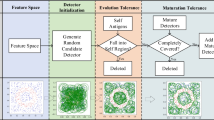Abstract
Dynamic Negative Selection Algorithm Based on Affinity Maturation (DNSA-AM) is proposed to generate dynamic detectors changed with nonselves. But it can not be adapted to the change of self because the match threshold is constant. In this work, a match range model inspired from T-cells maturation is proposed. Based on the model, an augmented algorithm is proposed. There is no match threshold but self-adapted match range. The proposed algorithm is tested by simulation experiment for anomaly detection and compared with DNSA-AM. The results show that the proposed algorithm is more effective than DNSA-AM with several excellent characters such as self-adapted match range and less time complexity.
Preview
Unable to display preview. Download preview PDF.
Similar content being viewed by others
References
Forrest, S., Perelson, A.S., Allen, L., Cherukuri, R.: Self-nonself Discrimination in a Computer. In: Proceedings of the 1994 IEEE Symposium on Research in Security and Privacy. IEEE Computer Society Press, Los Alamitos (1994), Available at http://www.cs.unm.edu/~forrest/papers.html
de Castro, L.N., Von Zuben, F.J.: aiNet: An Artificial Immune Network for Data Analysis. In: Abbass, H.A., Sarker, R.A., Newton, C.S. (eds.) Book Chapter in Data Mining: A Heuristic Approach, ch. XII, pp. 231–259. Idea Group Publishing, USA (2001)
de Castro, L.N., Von Zuben, F.J.: Learning and Optimization Using the Clonal Selection Principle. IEEE Transactions on Evolutionary Computation, Special Issue on Artificial Immune Systems 6(3), 239–251 (2002)
Dasgupta, D., Forrest, S.: Novelty Detection in Time Series Data using Ideas from Immunology. In: Proceedings of The International Conference on Intelligent Systems (1999)
Hofmeyr, S.A.: An Immunological Model of Distributed Detection and its Application to Computer Security, PhD Dissertation, University of New Mexico (1999)
González, F., Dagupta, D.: Anomaly detection using real-valued negative selection. Genetic Programming and Evolvable Machines 4(4), 383–403 (2003)
Wenjian, L.: Research on Artificial Immune Model and Algorithms Applied to Intrusion Detection, PhD Dissertation, University of Science and Technology of China (2003)
de Castro: Artificial Immune Systems and Their Applications. At the Brazilian Symposium on Neural Networks (SBRN 2000), November 22-25, Rio de Janeiro/Brazil (2000)
Gonzalez, F.: A Study of Artificial Immune Systems applied to Anomaly Detection, PhD Dissertation, The University of Memphis (May 2003)
Author information
Authors and Affiliations
Editor information
Editors and Affiliations
Rights and permissions
Copyright information
© 2005 Springer-Verlag Berlin Heidelberg
About this paper
Cite this paper
Chen, J., Liang, F., Yang, D. (2005). Dynamic Negative Selection Algorithm Based on Match Range Model. In: Zhang, S., Jarvis, R. (eds) AI 2005: Advances in Artificial Intelligence. AI 2005. Lecture Notes in Computer Science(), vol 3809. Springer, Berlin, Heidelberg. https://doi.org/10.1007/11589990_94
Download citation
DOI: https://doi.org/10.1007/11589990_94
Publisher Name: Springer, Berlin, Heidelberg
Print ISBN: 978-3-540-30462-3
Online ISBN: 978-3-540-31652-7
eBook Packages: Computer ScienceComputer Science (R0)




